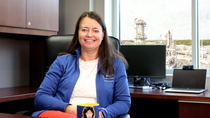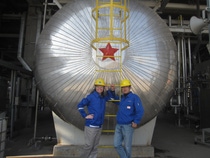Media
Taking the lead: Beth Holland and BASF's world-scale MDI expansion

A builder and problem solver at heart, Beth Holland’s most recent challenge is to lead the third phase of the MDI expansion.
Some people are born to work in manufacturing. Having the chance to put on a uniform, a hard hat, steel-toe shoes, and work in a plant with one’s hands is not for everyone. Yet, these are among the many reasons why the Vice President & Project Execution Owner of the Geismar methylene diphenyl diisocyanate (MDI) 3 Project, Beth Holland, decided to pursue a career in this field.
A Jill of all trades
Having earned a master’s degree in Chemical Engineering in 1999, Beth decided to take an internship role and spend a summer working at BASF’s headquarters in Ludwigshafen, Germany, or as she puts it, “a chemical engineer’s playground, where you can see firsthand everything that is possible, all that you can do.”
There she discovered her love for the manufacturing environment and hasn’t left since. For the past 25 years, Beth’s career led her to various opportunities within BASF, both in the U.S. and globally. She has transitioned from more operational roles to executive roles, managing significant projects and business areas along the way
Over the course of her career, Beth has worked in some of BASF’s biggest sites in the U.S. as well as in smaller, more specialized locations. “Every site has its own character. In North America alone, we have more than 100, and each is different. What I love about a smaller site is the opportunity to control your own destiny. The benefit of our larger Verbund sites is that you can come to a full understanding of the complexity that comes with operating a fully integrated manufacturing site. It’s also nice to have lots of peers around you,” she remarks.
BASF operates six Verbund sites globally, with two of those located in North America. Verbund integration is one of BASF’s main strengths – intelligently connecting production plants and technologies to use resources and leverage expertise most efficiently.
Every one of Beth’s experiences has grown her passion for building things from the ground up. In 2004, she had the first opportunity to be a part of building a new plant, the alkylethanolamine plant in Geismar, Louisiana. This led to her next opportunity to build a three-plant complex at BASF’s Verbund site in Nanjing, China.
Back in the U.S., Beth returned to operating a small batch manufacturing site in West Memphis, Arkansas. It did not take too long however before BASF chose her to lead the Nylon 6 value Chain in Freeport, Texas which was in the process of backward integrating into a world-scale ammonia plant. Whether operating or constructing, Beth thrives on working with people in a manufacturing environment solving the problems and challenges that arise every day.
From an environmental standpoint, you have the biggest impact by being the one running the plant. You have a real opportunity to impact the footprint on the environment with the decisions you make each and every day.
Steering BASF’s largest wholly-owned investment in North America
More recently, Beth has taken on a new challenge: to lead the third-phase expansion of the methylene diphenyl diisocyanate (MDI) plant in Geismar, Louisiana. This involves the construction of the plant itself, the logistics, staffing, commissioning, start up, operations & maintenance execution. But there is also another crucial aspect to the role: the project owner is “someone who takes accountability for how it all fits together. I think it's one of the best jobs in the world and I am proud to be doing it for BASF,” shared Beth.
The MDI expansion is BASF’s largest wholly-owned investment in North America, not only because this material is in high demand and a key component to many daily products such as foams for insulation and refrigeration in homes, but also as it enables building lighter, more fuel-efficient cars. According to Beth, “what's important to us is that we have strong production capability in North America, which we already have in Europe and Asia.”
For the state of Louisiana, this expansion will bring new jobs, and a tax revenue increase, as well as a boost in business for local suppliers and providers. On the other hand, for the more than 100 people from America, China, and India working full-time on the expansion project, it also represents a significant challenge. This expansion requires “a much more global execution strategy, it’s a new opportunity. We're tackling the first large-scale modular design for BASF. And it provides the opportunity to further build our experience with digital tools,” she explains.
The renaissance of manufacturing
The manufacturing industry has come a long way since its beginnings, and yet, the relationship with consumers has grown further apart, to the point where, for Beth, people have “forgotten” about what goes into the process of building new things.
She hopes to see a renaissance in the future of the industry. “I hope people will come to appreciate how important manufacturing is. I think the pandemic taught us what can happen when our global supply chain networks don't work. And that's why manufacturing is increasingly important, both locally and globally.”
For the chemical industry, she considers that industrial construction is also in need of a renaissance: “making sure we have modern and efficient construction capabilities is really important to the success of manufacturing.”
There is also a very real need to inject the industry with digitalization. “What I see is very much a culture change, even a culture clash, underway. You essentially have a generation that understands how to build and run manufacturing plants, and then you have people who have expertise in implementing digital tools. Moving forward, we need digital translators –people who can somehow articulate those two spaces and merge them together to enable the transition to a more digital workforce,” Beth reflects.
Lessons from a female leader in manufacturing
As part of a historically male-dominated industry, Beth is well aware of the challenges she’s had to face throughout her own path, and what many women in manufacturing still face today. “You’re often underestimated. When I took the job in China, it was a shock for many. They did not believe that was something I was going to say yes to and wanted to do. I think there's just a general underestimation of what women are willing to do to make a tangible impact while also advancing their careers.”

At the same time, she recognizes that many of the roadblocks are not exclusive to women. Gaining manufacturing experience and knowledge is a major factor for advancement and oftentimes people new to the industry need to pursue that knowledge themselves. “You have to be a driver, you have to be a self-starter, you have to ask for the information. Some people will give it freely, while others will not. We don't have a great deal of structure in how we transfer knowledge from more experienced colleagues to others.”
For her, there are still many things that can be done to improve the experience of working in manufacturing, such as infrastructure and environment, “considering how a person works and how that affects their lifestyle is something our industry needs to do more of.”
And finally, her advice to anyone looking to forge their own path in manufacturing is to “take a risk on yourself. I couldn’t imagine some of these opportunities that would come to me. Say yes even when you’re not sure if you know how to do something. I made a career out of saying ‘I don’t know’, even when I was very uncomfortable, and was fortunate enough to find someone to help or teach me. You need to become comfortable with ambiguity.” For Beth, this mindset has clearly worked well, giving her an enviable career path and many impactful opportunities, with much more still to come.
Published on March 29, 2023, by Mariana Licio.
For media inquiries or to repurpose this article, please contact Lisa Brown.

